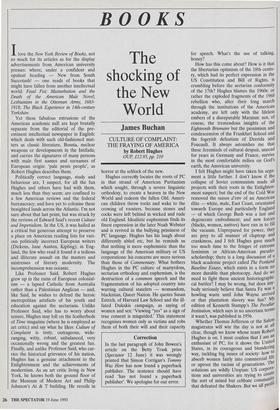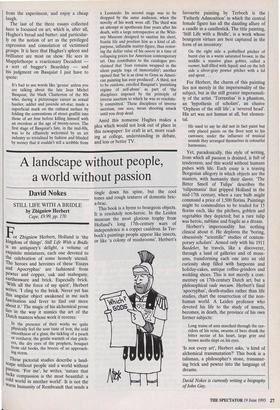BOOKS
The shocking of the New World
James Buchan
CULTURE OF COMPLAINT: THE FRAYING OF AMERICA by Robert Hughes OUP, £12.95, pp. 210 Ilove the New York Review of Books, not so much for its articles as for the display advertisements from American university presses: where, under a confident and opulent heading — New from South Succotash! — one reads of books that might have fallen from another intellectual world: Fatal Fist: Masturbation and the Death of the American Male Novel; Lesbianism in the Ottoman Army, 1683- 1918; The Black Experience in 14th-century Yorkshire.
Yet these fabulous extrusions of the American academic mill are kept brutally separate from the editorial of the pre- eminent intellectual newspaper in English: which deals with such old-fashioned mat- ters as classic literature, Bosnia, nuclear weapons or developments in the Intifada; and carries the signatures of many persons with male first names and surnames of European origin: 'pale penis people', as Robert Hughes describes them.
Politically correct language, study and behaviour are, I suspect, for all the fun Hughes and others have had with them, much less than they seem; are confined to a few American reviews and the federal bureaucracy; and have yet to colonise these benighted lands across the Atlantic. I'm not sure about that last point, but was struck by the reviews of Edward Said's recent Culture and Imperialism. In the US, it was hailed as a critical but generous attempt to preserve a place on American reading lists for vari- ous politically incorrect European writers (Dickens, Jane Austen, Kipling); in Eng- land, the few who read it found it a tedious and illiterate assault on the masters and mistresses of literary modernity. The incomprehension was oceanic.
Like Professor Said, Robert Hughes grew up in the ruins of European colonial- ism — a lapsed Catholic from Australia rather than a Palestinian Anglican — and, like Said, he wishes to defend the heroic metropolitan artefacts of his youth and education against the sectarians. Unlike Professor Said, who has to worry about tenure, Hughes may loll on the featherbeds of Time magazine (where he is employed as art critic) and say what he likes: Culture of Complaint is testy, outrageous, wide- ranging, witty, robust, unbalanced, very occasionally wrong and the greatest fun. Finally, and unlike Professor Said, who car- ries the historical grievance of his nation, Hughes has a genuine attachment to the Enlightenment and the achievements of modernism. As an art critic living in New York, he knows both the ground floor of the Museum of Modern Art and Philip Johnson's At & T building. He recoils in horror at the schlock of the new.
Hughes correctly locates the roots of PC in that strand of American Puritanism which sought, through a severe linguistic orthodoxy, to create a heaven in the New World and redeem the fallen Old. Ameri- can children throw rocks and wake to the crowing of roosters, because stones and cocks were left behind in wicked and rude old England. Idealistic euphemism finds its finest expression in the later Noah Webster and is revived in the bullying prissiness of PC language. Hughes has his laugh about differently abled etc, but he reminds us that nothing is more euphemistic than the language of the American military or US corporations: his concerns are more serious than those of Commentary. What bothers Hughes in the PC culture of martyrdom, sectarian orthodoxy and euphemism, is the destruction of a common speech and the fragmentation of his adopted country into warring cultural statelets — womandom, blackistan, Queer Nation. He quotes Susan Estrich, of Harvard Law School and the ill- fated Dukakis campaign, as saying of women and sex: 'Viewing "yes" as a sign of true consent is misguided.' This statement recognises women only as victims and robs them of both their will and their capacity for speech. What's the use of talking, honey? How has this come about? How is it that the libertarian optimism of the 18th centu- ry, which had its perfect expression in the US Constitution and Bill of Rights, is crumbling before the sectarian conformity of the 17th? Hughes blames the 1960s: or rather the exploded fragments of the 1968 rebellion who, after their long march through the institutions of the American academy, are left only with the lifeless embers of a disreputable Marxism: not, of course, the tremendous insights of the Eighteenth Brumaire but the pessimism and condescension of the Frankfurt School and the fogeyish defeatism of Derrida and Foucault. It always astonishes me that these Jeremiads of cultural despair, unread for years in Germany and France, survive in the most comfortable milieu on God's earth, the American university.
I felt Hughes might have taken his argu- ment a little further. I don't know if the collapse of Soviet communism made all projects with their roots in the Enlighten- ment suspect; but the end of the Cold War removed the raison d'etre of an American elite — white, male, East Coast, orientated towards Europe and particularly England of which George Bush was a last and degenerate embodiment; and new forces (blacks, women, natives) have run in to fill the vacuum. Unprepared for power, they are prey to all manner of claptrap and crankiness, and I felt Hughes gave much too much time to the fringes of extreme feminism or African-American pseudo- scholarship; there is a long discussion of a black academic project called The Portland Baseline Essays, which exists in a form no more durable than photocopy. And do we need to fight these ancient historiographi- cal battles? I may be wrong, but does any- body seriously believe that Santa Fe was a howling waste until John Wayne arrived or that plantation slavery was fun? MY edition of Kenneth Stampp's The Peculiar Institution, which says in no uncertain terms it wasn't, was published in 1956. Whether Thomas Jefferson or the Salem magistrates will win the day is not at all clear, though we know whose team Robert Hughes is on. I must confess that I am an enthusiast of PC, for it shows the United States, in its courageous and blundering way, tackling big issues of society: how to absorb women fairly into commercial life or uproot the racism of generations. The solutions are wildly Utopian: US corpora- tions and universities are trying to create the sort of mixed but celibate community that defeated the Shakers. But we all profit
from the experiment, and enjoy a cheap laugh.
The last of the three essays collected here is focussed on art, which is, after all, Hughes's bread and butter; and particular- ly on the notion of art as the privileged expression and consolation of victimised groups. It is here that Hughes's spleen and brilliance are most on show. He sees in Mapplethorpe a reactionary Decadent a sort of bugger's Beardsley — and his judgment on Basquiat I just have to quote:
It's bad to use words like 'genius' unless you are talking about the late Jean Michel Basquiat, the black Chatterton of the 80s who, during a picturesque career as sexual hustler, addict and juvenile art-star, made a superficial mark on the cultural surface by folding the conventions of street graffiti into those of art brut before killing himself with an overdose at the age of twenty-seven. The first stage of Basquiat's fate, in the mid-80s, was to be effusively welcomed by an art industry so trivialised by fashion and blinded by money that it couldn't tell a scribble from a Leonardo. Its second stage was to be dropped by the same audience, when the novelty of his work wore off. The third was an attempt at apotheosis four years after his death, with a large retrospective at the Whit- ney Museum designed to sanitise his short, frantic life and position him as a kind of all- purpose, inflatable martyr-figure, thus restor- ing the dollar value of his oeuvre in a time of collapsing prices for American contemporary art. One contributor to the catalogue pro- claimed that 'Jean remains wrapped in the silent purple toga of immortality'; another opined that 'he is as close to Goya as Ameri- can painting has ever produced'. A third, not to be outdone, extolled Basquiat's 'punishing regime of self-abuse' as part of 'the disciplines imposed by the principle of inverse ascetism to which he was so resolute- ly committed.' These disciplines of inverse ascetism, one sees, mean shooting smack until you drop dead.
Amid this nonsense Hughes makes a plea which would not look out of place in this newspaper: for craft in art, more read- ing at college, understanding in debate, and less or better TV.



















































 Previous page
Previous page